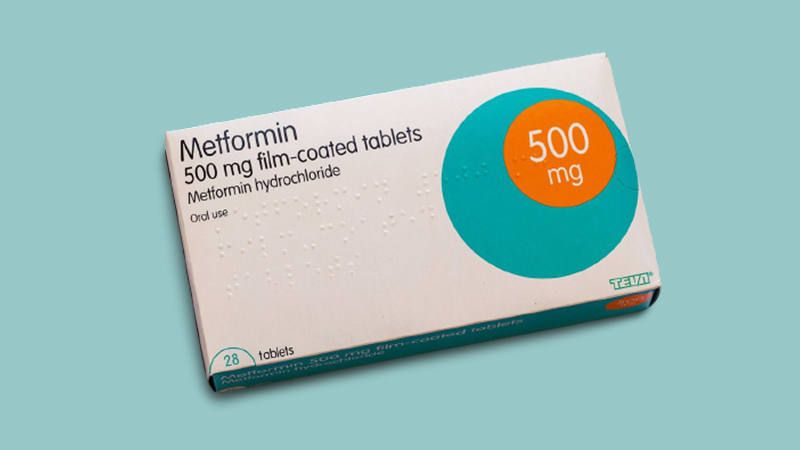Metformin, a commonly prescribed medication for managing type 2 diabetes, is celebrated for its effectiveness. However, for some individuals, it brings an unwelcome companion: stomach pain.
This puzzling side effect can leave many wondering why does Metformin cause stomach pain. Here, we will dive into the reasons behind Metformin-induced stomach pain.
Metformin’s primary function is to lower blood sugar levels, making it an essential tool in diabetes management.
Yet, its impact on the gastrointestinal system can lead to symptoms such as nausea, cramps, and diarrhea, often experienced when starting the medication.
The mechanisms behind this discomfort are crucial for those on Metformin, enabling them to mitigate its effects and ensure they receive the full benefits of this vital drug. Stay focused.
What is Metformin?

Metformin is a widely prescribed medication used to manage type 2 diabetes. It belongs to the class of drugs known as biguanides and primarily works by lowering blood sugar levels.
Metformin enhances the body’s sensitivity to insulin, a hormone crucial for regulating blood glucose.
It reduces the production of glucose in the liver while also increasing the uptake of glucose by muscles. Metformin is usually taken orally in the form of tablets or liquid.
It is often the first-line treatment for type 2 diabetes, helping to control blood sugar and prevent complications associated with the condition, such as heart disease and kidney problems.
Besides its primary use for diabetes, some studies suggest potential benefits in other areas, including weight management and polycystic ovary syndrome (PCOS).
However, it is essential to use Metformin under the guidance of a healthcare professional due to potential side effects and individualized dosing requirements.
Common Side Effects of Metformin

Common side effects of Metformin, a medication used to manage type 2 diabetes, can include:
Gastrointestinal Distress
Metformin often brings gastrointestinal distress as a common companion. This may manifest as nausea, vomiting, diarrhea, abdominal discomfort, or bloating.
These symptoms are particularly prominent when initiating Metformin therapy. Fortunately, for many, they tend to lessen or resolve with time as the body adjusts to the medication.
If they persist or worsen, consulting a healthcare provider can help find solutions to manage these side effects effectively.
Metallic Taste
Some Metformin users report experiencing a peculiar metallic taste in their mouth. While this side effect is less common than gastrointestinal symptoms, it can be bothersome.
Maintaining proper oral hygiene and staying hydrated may help alleviate this sensation.
Loss of Appetite
Metformin has been known to reduce appetite in certain individuals. While this effect isn’t universal, it’s essential to monitor your eating habits and maintain a balanced diet to ensure adequate nutrition.
Lactic Acidosis (Rare)
Lactic acidosis is a severe but rare side effect of Metformin. Although uncommon, it is potentially life-threatening and requires immediate medical attention.
Symptoms may include weakness, a slow heart rate, muscle pain, and difficulty breathing. It’s crucial to seek immediate medical help if you experience any of these symptoms while on Metformin.
Vitamin B12 Deficiency
Long-term Metformin use has been associated with vitamin B12 deficiency, which can lead to various health issues, including anemia and neuropathy.
Regular monitoring of B12 levels and discussing potential supplementation with your healthcare provider is advisable for those on prolonged Metformin therapy.
Low Blood Sugar (Hypoglycemia)
While Metformin is not typically associated with hypoglycemia when used alone, it can contribute to low blood sugar if taken inappropriately or in combination with other diabetes medications.
Symptoms of hypoglycemia include dizziness, sweating, confusion, and shakiness. Careful medication management and regular blood sugar monitoring are essential to prevent and manage this condition.
Changes in Stool
Some individuals may notice alterations in the color or texture of their stool while taking Metformin. These changes are usually benign and may not cause concern unless accompanied by other severe symptoms.
It’s crucial to discuss any side effects with your healthcare provider.
They can help manage these effects and determine if Metformin is the right treatment for you, considering your individual health and medical history.
Why Does Metformin Cause Stomach Pain?

Metformin can cause stomach pain or gastrointestinal discomfort in some individuals, primarily when they first start taking the medication. Several reasons contribute to this side effect:
Gastrointestinal Irritation
Metformin can irritate the lining of the stomach and intestines. This irritation can lead to symptoms such as nausea, abdominal cramping, and a sense of fullness or bloating.
Altered Gut Microbiota
Metformin may influence the composition of the gut microbiota, which can lead to gastrointestinal symptoms. Changes in gut bacteria can affect digestion and lead to discomfort.
Dosage and Individual Sensitivity
The severity of stomach pain can vary depending on the dosage of Metformin and an individual’s sensitivity to the medication. Starting with a lower dose and gradually increasing it can help reduce this side effect.
Food Intake
Taking Metformin with food, especially complex carbohydrates, can often alleviate stomach pain. Food can help slow down the absorption of the medication and reduce irritation.
Extended-Release Formulation
Some people find that switching to the extended-release (ER) form of Metformin is easier on the stomach.
ER formulations release the medication slowly over time, which can result in fewer gastrointestinal side effects.
Temporary Effect
In many cases, stomach discomfort caused by Metformin tends to improve or even disappear with continued use as the body adjusts to the medication.
If you experience persistent or severe stomach pain while taking Metformin, it’s essential to consult your healthcare provider.
What to Do to Reduce Stomach Pain As A Side-effect of Metformin?
If you’re experiencing stomach pain as a side effect of Metformin, there are several steps you can take to reduce or manage this discomfort:
Take Metformin with Food
Eating a meal or a snack before taking Metformin can help reduce stomach irritation. Complex carbohydrates and fiber-rich foods can be particularly helpful in minimizing gastrointestinal side effects.
Start with a Lower Dose
If you’re just beginning Metformin treatment, your healthcare provider may start you on a lower dose and gradually increase it to give your body time to adjust. Follow their dosing instructions carefully.
Switch to Extended-Release (ER) Formulation
Talk to your doctor about switching to an extended-release version of Metformin if you’re currently using the immediate-release form.
The ER formulation often has fewer gastrointestinal side effects because it releases the medication slowly over time.
Stay Hydrated
Drinking plenty of water throughout the day can help alleviate some gastrointestinal discomfort associated with Metformin.
It can also help prevent dehydration, which is crucial when experiencing diarrhea or vomiting.
Monitor Your Diet
Pay attention to your diet and make healthy choices. Avoid excessive consumption of high-fat, greasy, or spicy foods that can exacerbate stomach issues.
Focus on a balanced diet with plenty of fruits, vegetables, and whole grains.
Be Patient
In many cases, stomach discomfort caused by Metformin tends to improve over time as your body becomes accustomed to the medication. Be patient and give it a few weeks unless the discomfort is severe or persistent.
Consult Your Healthcare Provider
If your stomach pain continues or becomes severe, consult your healthcare provider.
They can assess your condition, consider alternative treatments, adjust your dosage, or recommend medications to alleviate gastrointestinal symptoms.
Consider Probiotics
Some individuals find relief from stomach discomfort by taking probiotic supplements, which can help restore a healthy balance of gut bacteria. However, consult your doctor before starting any new supplements.
Remember that individual responses to medications can vary, and what works best for one person may not be the same for another.
Always follow your healthcare provider’s guidance and communicate any side effects or concerns you have about your medication.
Coping with Metformin-Induced Stomach Pain

Coping with Metformin-induced stomach pain can be challenging, but several strategies can help you manage this side effect and continue your diabetes treatment effectively:
Communicate with Your Healthcare Provider
Open and honest communication with your healthcare provider is essential. Let them know about your stomach pain and any other side effects you’re experiencing.
They can adjust your treatment plan or recommend alternative medications if necessary.
Take Medication as Directed
Follow your doctor’s instructions regarding when and how to take Metformin. This includes taking it with or after food to minimize stomach irritation.
Avoid crushing or splitting the tablets unless advised by your healthcare provider.
Stay Hydrated
Drink plenty of water throughout the day to help with digestion and prevent dehydration, especially if you’re experiencing diarrhea or vomiting.
Gradual Dosage Increase
If you’re starting Metformin or changing your dose, request a gradual increase. Slowly introducing the medication to your system can reduce the intensity of stomach discomfort.
Eat a Balanced Diet
Focus on a well-balanced diet rich in fruits, vegetables, whole grains, and lean proteins. Avoid foods that may aggravate your stomach, such as greasy or spicy items. Smaller, more frequent meals can also help.
Consider Extended-Release (ER) Metformin
Consult your healthcare provider about switching to the extended-release version of Metformin if you’re not already on it. ER Metformin tends to have fewer gastrointestinal side effects.
Probiotics
Some individuals find relief by taking probiotic supplements or consuming probiotic-rich foods like yogurt. These can help maintain a healthy gut microbiome.
Over-the-Counter Remedies
Over-the-counter antacids or anti-diarrheal medications may provide temporary relief. However, consult your doctor before using these products to ensure they won’t interact with Metformin.
Monitor Blood Sugar
Continue to monitor your blood sugar levels as advised by your healthcare provider to ensure your diabetes is well-managed. Even with stomach discomfort, it’s crucial to keep your blood sugar within a healthy range.
Be Patient
Understand that stomach discomfort caused by Metformin can improve over time as your body adjusts. It may take a few weeks for the side effects to subside.
Discuss Alternative Medications
If Metformin-induced stomach pain persists despite trying various coping strategies, talk to your healthcare provider about alternative diabetes medications that may be better tolerated.
Remember that everyone’s response to medications can vary, and it may take some trial and error to find the right treatment approach.
Alternative to Metformin

There are several alternative medications for managing type 2 diabetes if Metformin is not suitable or well-tolerated for an individual.
The choice of an alternative medication depends on various factors, including your specific health needs, medical history, and any potential contraindications. Here are some common alternatives to Metformin:
Sulfonylureas (e.g., Glipizide, Glyburide)
These medications stimulate the pancreas to release more insulin. They are often used when lifestyle changes and Metformin are not sufficient in controlling blood sugar.
However, they can cause low blood sugar (hypoglycemia) and may lead to weight gain.
DPP-4 Inhibitors (e.g., Sitagliptin, Saxagliptin)
Dipeptidyl peptidase-4 (DPP-4) inhibitors help regulate blood sugar by increasing the levels of incretin hormones. They are generally well-tolerated and have a lower risk of causing hypoglycemia.
GLP-1 Receptor Agonists (e.g., Liraglutide, Exenatide)
Glucagon-like peptide-1 (GLP-1) receptor agonists are injectable medications that stimulate insulin production, reduce appetite, and slow down stomach emptying.
They can lead to weight loss and are suitable for some people who struggle with weight management.
SGLT2 Inhibitors (e.g., Canagliflozin, Empagliflozin)
Sodium-glucose cotransporter-2 (SGLT2) inhibitors work by causing the kidneys to remove excess glucose through urine. They can also lower blood pressure and have shown cardiovascular benefits.
Alpha-glucosidase inhibitors (e.g., Acarbose, Miglitol)
These drugs slow down the absorption of carbohydrates in the digestive tract, helping to control blood sugar levels after meals. They are often used in combination with other medications.
Thiazolidinediones (e.g., Pioglitazone, Rosiglitazone)
Thiazolidinediones improve insulin sensitivity in cells. They can be effective but have been associated with an increased risk of heart problems and may cause weight gain.
Insulin
In some cases, insulin therapy may be necessary, especially when blood sugar levels cannot be adequately controlled with oral medications. Different types of insulin are available, including long-acting and rapid-acting forms.
Combination Therapies
Your healthcare provider may recommend combining two or more diabetes medications to achieve better blood sugar control.
It’s crucial to work closely with your healthcare provider to determine the most suitable alternative to Metformin based on your individual health profile.
Lifestyle modifications, including diet and exercise, remain essential components of diabetes management regardless of the medication chosen.
FAQs
Why does Metformin cause stomach pain?
Metformin can irritate the gastrointestinal tract, leading to stomach pain. It often occurs when starting the medication but may improve over time.
Taking Metformin with food and adjusting the dose gradually can help mitigate this side effect.
Can a metallic taste in the mouth be caused by Metformin?
Yes, some people experience a metallic taste as a side effect of Metformin. While less common than stomach discomfort, it’s one of the potential side effects of the medication.
Is loss of appetite a common side effect of Metformin?
Metformin may reduce appetite in some individuals. However, this side effect is not experienced by everyone, and it’s essential to maintain a balanced diet to ensure proper nutrition.
What is lactic acidosis, and how rare is it as a side effect of Metformin?
Lactic acidosis is a rare but severe side effect of Metformin. It involves a dangerous buildup of lactic acid in the body and requires immediate medical attention. While rare, it’s important to be aware of its potential risks.
Can Metformin lead to vitamin B12 deficiency?
Yes, long-term Metformin use has been associated with vitamin B12 deficiency, which can lead to anemia and neuropathy.
Regular monitoring of B12 levels and discussing potential supplementation with your healthcare provider is advisable for those on prolonged Metformin therapy.
Wrapping Up
In the realm of diabetes management, Metformin stands as a cornerstone medication, but its propensity to cause stomach pain can be challenging.
However, with knowledge and proactive measures, individuals can minimize or even overcome this discomfort while reaping the benefits of stable blood sugar control.
As we’ve uncovered in this blog post, Metformin-induced stomach pain often results from gastrointestinal irritation, altered gut microbiota, dosage adjustments, and individual sensitivity.
By taking Metformin with food, starting with a lower dose, and discussing extended-release formulations with a healthcare provider, you can significantly reduce the impact of stomach discomfort.
Remember, the journey to effective diabetes management may involve some adjustments and patience.
Always maintain an open dialogue with your healthcare provider to ensure your treatment plan aligns with your specific needs and concerns. Best of luck.
Hi, I’m Mark Pattinson and I’m a freelance personal trainer. I’ve been working in the fitness industry for over 10 years especially since I work with diabetes patients and I love helping people achieve their fitness goals. I believe that everyone can benefit from a good workout, and I’ll do everything to make sure you get the most out of your training.